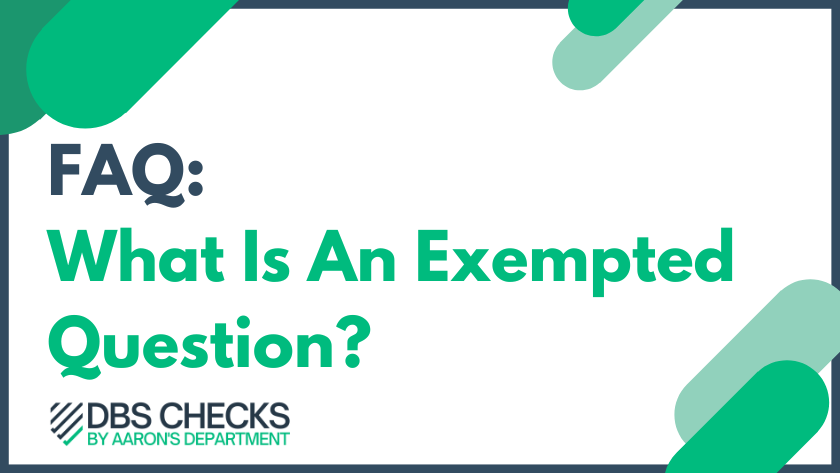What is an Exempted Question?
When getting a DBS check for existing staff or new hires, employers must be entitled by law to ask them to disclose their criminal history. The act of this disclosure is known as “asking an Exempted Question”.
In this blog, we’ll go over the legislation surrounding Exempted Questions, eligibility to ask them, and why Basic DBS checks aren’t covered by the phrase.


Who Can Ask An Exempted Question?
To ask an Exempted Question for a staff member or new-hire, the employer has to be certain that they are requesting the correct level of check. Otherwise, they risk illegally asking an Exempted Question.
For example, if you requested an Enhanced DBS check for a staff-member who is only eligible for a Basic check, that would be against the law because you have required them to disclose more information than they are legally obliged to.
Why Basic DBS Checks Aren’t “Exempted Questions”
Because Basic DBS checks can be requested for anybody, for any reason, with no eligibility requirements, they are not considered to be “asking an Exempted Question”.


What Roles Require An Exempted Question To Be Asked?
How can you be sure you’re getting the right level of check? We’ve provided eligibility guides for each level of check
Enhanced DBS Checks
If your applicant needs a DBS because they will be working with children or Vulnerable Adults, this is the check for them. You’ll also need to determine whether they require a check of the Barred Lists, but the link below will help you decide what’s needed:
Standard DBS Checks
Standard DBS checks are required for an eclectic, yet quite limited mix of roles. In practice, the DBS treats Standard checks as the: “we need more than a Basic for them, but they can’t legally have an Enhanced” category.
You can read our guide to who needs Standard checks, linked below:
Basic DBS Checks
As mentioned, these can be legally requested with no eligibility concerns – just make sure the role doesn’t legally require a Standard or Enhanced! We’ve linked our guide to Basic checks below:
Which Legislation Introduced Exempted Questions?
The “Rehabilitation of Offenders Act 1974 (Exceptions) Order 1975” introduced Exempted Questions as a concept.
The reasoning for it is, that once offenders have served their time, they shouldn’t be discriminated against by society – they’ve already served their punishment.
However, employers of staff working in roles involving vulnerable groups, high levels of trust, or sensitive information are still permitted to “ask an Exempted Question” of their staff.
Many people in the UK have encountered legal issues in the past. If you’re concerned about the implications of a DBS check, you’re part of a group with similar worries. It’s worth noting that not all professions mandate a DBS check, opening up opportunities where only disclosing unspent convictions is necessary.
It is also important to remember that possessing a criminal record doesn’t automatically disqualify you from roles requiring a DBS check. Employers are expected to assess each applicant on their merits, and minor convictions don’t necessarily hinder employment prospects. Especially if the offence occurred some time ago, and you’ve maintained a clean record since, employers are likely to consider your application positively.
Summary
Only staff working in specific job roles are eligible to have an Exempted Question asked of them, so make sure you request the correct level of check!
If you’d like some help determining your employees’ eligibility, or require the services of a DBS Umbrella Body for your organisation, that’s us! If you need any help or advice, feel free to get in touch today.
Forward someone this article!
Further Reading
If you’ve found our post useful, you might also find these posts by us helpful:
About The Author


Kellie Dawson
Kellie is our in-house legal expert when it comes to DBS checks. With a background in the legal sector, she has become a recognised authority in this area.
